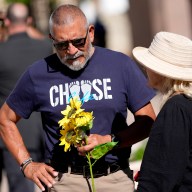Great things come in small packages in Israeli writer Etgar Keret’s short fiction collection “Suddenly, a Knock on the Door.” These slices of contemporary life — unceremonious, candid, raw and affecting — pack a punch in as few as one to two pages, one so complete that it leaves a mark on your memory long after. Tense exchanges between parents and children, lovers and even — but maybe especially — strangers expose man’s most visceral responses to what triggers his blood to boil and heart to break.
At the same time, Keret’s laconic tales are not so sober. The author embraces man’s quirks, sometimes even comically naming his characters by these traits. He also masters magical realism. Fabulous metaphors of transformation include a goldfish that grants wishes, a portal to a world where lies have become truths, and a way to replace lovers with the yank of a zipper tab. “I never differentiate the ‘magical’ moments from the realistic ones,” claims Keret. “If [a protagonist] tries to win the heart of the love of his life, the last thing that concerns you as a writer is if he’ll break some physical laws in the process.”
However otherworldly, the author’s stories are often self-reflective. In the two that bookend the collection, the protagonists are boorishly forced by others to write on command — their respective livelihoods depend on it. While the pressures of the outside world weigh similarly on Keret’s process, he’s ultimately his own worst enemy. “Whenever I torture myself into writing, the result is embarrassingly bad,” he says, adding that it’s a mistake he continues to make and learn from. But his solution to writer’s block is surprisingly passive. “Writing is a gift,” he says. “I just find something else to do with my life until a new story presents itself.”
This organic approach explains why many of Keret’s stories are extrapolations: the focus shifts from one character’s inner-workings to another’s almost endlessly and effortlessly. Yet neither the author nor his readers ever lose track of his train of thought. Keret credits his own curiosity. “The story in itself is a mystery [to me],” he says. “Many times it doesn’t make any sense halfway through but I trust it to reach some kind of meaning in the end.”
Just as his story lines flow like a stream of consciousness, most of Keret’s characters are held captive by their own unfiltered, anxious and reactive thoughts. It’s something the author says we’re all guilty of. “Even when we think we are living in the ‘real’ world we keep inventing narratives that exist more in our heads than in the world around us. This isn’t necessarily bad provided we create an interpretation which is livable and bearable,” he argues.
Conversely, disengaging with the real world can be destructive, a symptom of an underlying despair. Keret’s protagonists are often dissatisfied with their present lives, suppressing their instincts, desires and/or true identities in order to please others. However, the author asserts that compromise, to some extent, is a price of admission worth paying in most relationships, “especially if the alternative is loneliness … which I always personally found too difficult and sad to handle.”
But how has Keret managed so brilliantly to keep a sense of humor in these tales of bitterness, impermanence and loss? “Humor is like those air bags they have in cars,” he says. “In cases of accidents it activates itself. I don’t think we could have survived without it.”
Q&A
How does your multinational worldview affect your attitude toward violence, tragedy and death?
The world we live in is a very violent and fearful place and the “neighborhood” in which I live is even more so. The relationship between the Middle East and the rest of the world is like the relationship between a reality [TV] show and the real world. They are made of the same ingredients but in a reality show, because of the extreme circumstances, those ingredients are more likely to turn into conflicts and acts of aggression. I always say that I’m not completely sure that Israel is the best place to live in but I am sure it is the best place to write in.













